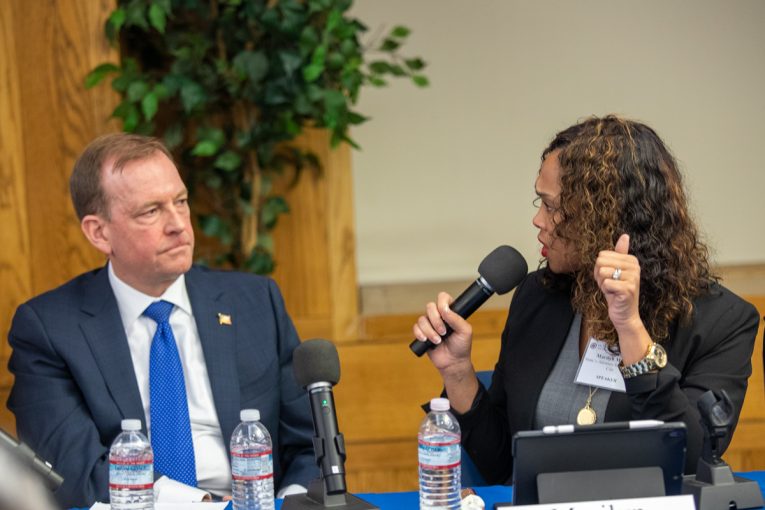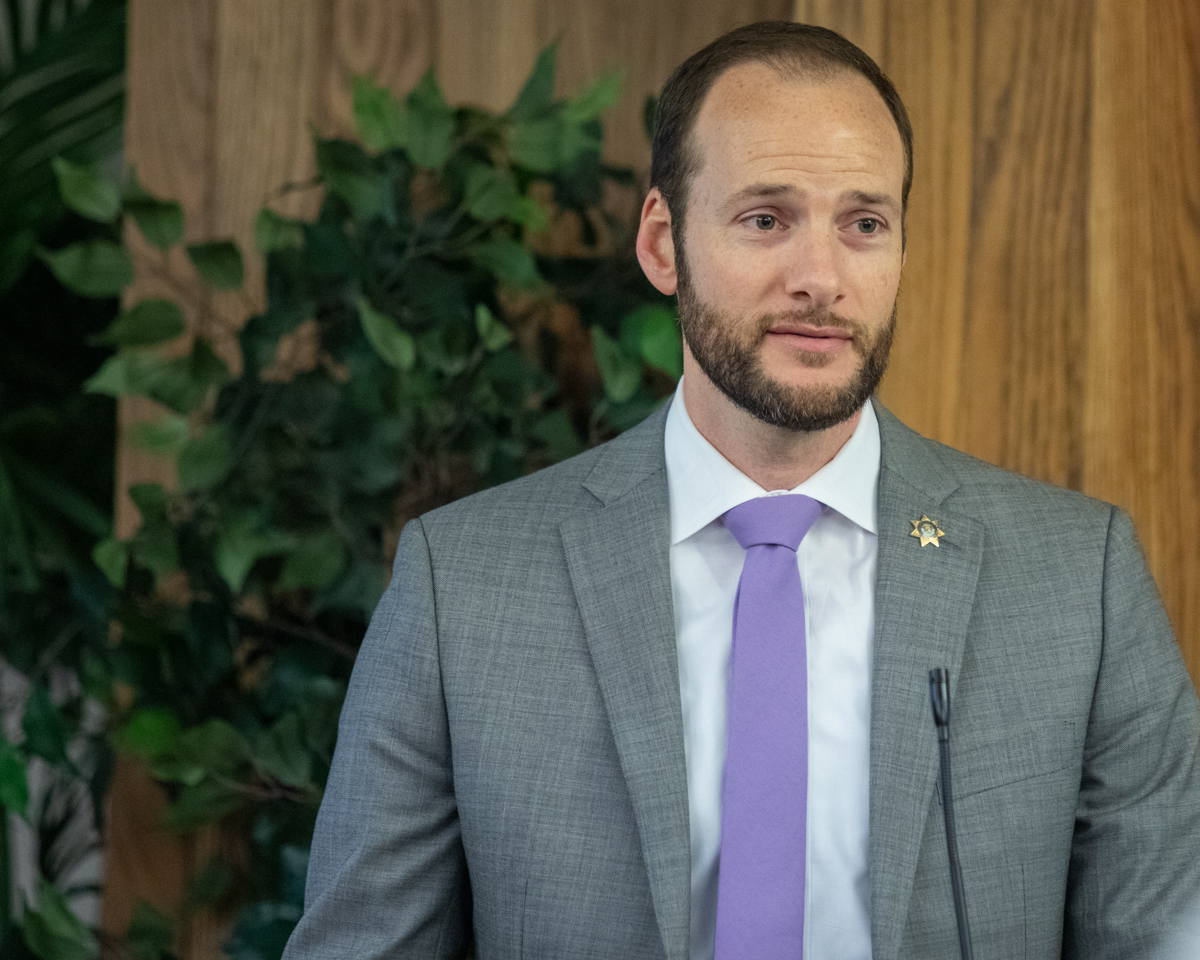

By Danielle Eden Silva
SAN FRANCISCO – United States Attorney from the Eastern District of California McGregor Scott claimed homicide rates and violent crimes were affected by the policies of the progressive prosecutor movement and received criticisms from other District Attorneys at the University of California, Hastings, Progressive Prosecution and the Carceral State Symposium.
The UC Hastings’s Progressive Prosecution and the Carceral State was a symposium hosted by the Hastings Journal of Crime and Punishment and the Hastings Race and Poverty Law Journal, hoping to address reform in prosecutorial practices and seeing how the movement of progressive prosecution related to broader criminal justice reform. They presented several panels, including the panel “Progressive Prosecution Through the Lens of Practitioners.”
This practitioner panel consisted of San Francisco DA Chesa Boudin, State’s Attorney for Baltimore City Marilyn Mosby, Suffolk County DA Rachel Rollins (which includes Boston), and United States  Attorney, Eastern District of California, McGregor Scott. The panel began with the attorneys explaining their viewpoints on the prosecution.
Attorney, Eastern District of California, McGregor Scott. The panel began with the attorneys explaining their viewpoints on the prosecution.
Rollins addressed coming into office in 2018 as a person from a multicultural family who had experience in the criminal justice system, having two brothers that went in and out of the system and one sister in recovery. She stated that she brought that experience to work every day and shared she was the first female DA in Suffolk County.
Mosby shared how she grew up in Boston with a family that had four generations of law enforcement but her first experience in the criminal justice system was her cousin being killed outside of her house. Were it not for the testimony of her neighbor, her family would not have gotten justice. Mosby won the State’s Attorney for Baltimore City race against the incumbent in 2015, which was during a time before the progressive prosecutor movement developed this network.
“Conviction rate is not a measure of success,” Mosby said in regards to her efforts in establishing reform. “Justice is the only barometer of success.”
“I stand on the shoulders of giants,” Boudin said as he began his introduction. He shared he was grateful for those who “decided to do things untraditional, unconventional, and unpopular.”

Boudin noted his experience with a mother who was in the system for 22 years and his father who is still incarcerated. He stated how the majority of Americans know someone or have a loved one in the criminal justice system and it is a “culture defined by the experience of incarceration.”
The San Francisco DA stated his resolve to close County Jail 4, located in the Hall of Justice’s 7th floor.
Scott began by stating he viewed himself as a progressive prosecutor but he appeared to be a “contrarian.” He stated the criminal justice system needed to be made into a more fair place and was not perfect but could be made better. Scott said that he supported issues like providing drug and mental illness treatment, establishing reentry courses, reaching out to the community, and making sure to address hate crimes.
That said, Scott stated he “respectfully disagreed” with the progressive prosecution movement for four reasons.
“Number one, in many ways, it usurps the role of the legislative branch in government. Two, there’s a fundamental misunderstanding of the role of county prosecutors. Three, many times in districts with progressive prosecutors, violent crime rates have gone up. And four, all too often, victims are forgotten.”

For his first point, Scott noted that progressive prosecutors may choose not to prosecute whole categories, such as choosing not to seek the death penalty. He argues this should be determined by legislators.
For his second point, he said, “The District Attorney does not represent the defendant. From the California District Attorneys’ website, ‘The primary goal of the District Attorney is to protect the community he or she is elected to serve. District Attorneys represent the public and endeavor to improve public safety by prosecuting those who threaten the well-being of the community and its citizens by breaking the law. Ultimately, a DA strives to improve the community he or she represents by making it a better place to live for everyone.’”
Scott stated cases are noted as the People of the State vs. the defendant and that the job to represent the defendant is on a capable public defender.
On his third point, Scott quoted several statistics to support his argument that violent crime rates have gone up in districts with progressive prosecutors.
“In the past two years, there has been a general decline in the homicide rate across the United States. In Philadelphia, in 2018, the first year of Mr. Krasner’s term as district attorney, homicides went up 11 percent, the highest rate in more than a decade. In 2019, they were up again, and as of this morning, year to date over 2019, they are up again another 26 percent,” Scott stated.
“In Baltimore, homicides have risen yearly since 2015. In 2019, the highest number of per capita murders in Baltimore’s history took place. In a 24 hour period in January this year, there were eight separate shootings with 12 people wounded and five people dead in Baltimore,” Scott said.
In regard to his fourth point, he noted how “sweetheart deals” lead to victims being the afterthought, arguing again that in 2018 92 percent of Philadelphia homicide victims were African American or Hispanic and 93 percent of Baltimore homicide victims were African American.

The moderator of the panel offered a question in terms of how district attorneys are supposed to measure success, to which DA Rollins responded with, “I want to comment on something else.”
Rollins, as a person elected and not appointed to do her job and “one of the less than 1 percent of people with melanin in this role,” said she was “tired… when US Attorneys hover in the good air and talk about communities they only touch with project safe neighborhoods.” She also stated that defendants were part of the community they are representing and defendants are also witnesses and victims of crimes.
“What I can say is just defendants are part of the community,” Rollins stated. “What I find fascinating is that people that have actually tried criminal cases in state courts or local jurisdictions know that defendants are witnesses to crimes and victims as crimes as well, figuratively or literally.
“When we treat them like trash when they’re defendants and wonder why their family members who all know this don’t want to come forward or help, these are our potential jurors,” Rollins added.
Boudin pointed out, “The California District Attorneys Association, of which I am a part and of which Greg was a part when he was a district attorney, regularly lobbies for law changes, effectively prevents criminal justice reform at the legislative level, and, even once those laws pass, fights to undermine them.”
He noted that public safety is something that needs to be considered when measuring success but the public they are to protect “is not limited to certain people and certain procedural postures in a case.” Boudin argued for an approach to heal and not punish.

Mosby argued that the “rhetoric” that Scott was using in reference to violent crime and criminal justice reform did not have a correlation. In response to the Baltimore statistics, she shared how she had been working with multiple police commissioners and mayoral administrations to apply police accountability, ranging from the Freddy Gray case to “the thousands of cases of corrupt police officers within were not only going and planting guns and drugs on individuals but redistributing guns and drugs on the streets of Baltimore.
“So before you talk and draw any sort of correlation to criminal justice reform or to sit up here and to say that we are somehow usurping legislators, understanding that you are a prosecutor and the awesome discretion that comes with it, should understand that if you are a truly progressive prosecutor as you noted, a progressive prosecutor or progressive person is a person advocating for the implementation of social reform or new liberal ideas. We are moving away from the rhetoric of the tough on crime approach, the war on drugs, stop and frisk, zero-tolerance policing and winning at all costs which has led to mass incarceration and the over-criminalization of poor brown and black people,” Mosby said.
She also noted that she has stopped prosecuting low-level marijuana possession case, as those are considered counterproductive. “If you’re so familiar with Baltimore, you would understand that in 2018, we had a 26 percent homicide clearance rate. That means we’re solving one out of four cases. So, to have people still prosecuting low levels of marijuana where you’re going into court… that doesn’t make sense.”

In addition, she explained the racial disparity where officers were required to give citations after the ten grams or less possession of marijuana, and “42 percent of the citations… went to one of the nine police districts… the western district which happens to be 95 percent black and disproportionately impoverished.”
Boudin and Rollins also added that, in their counties, homicide and violent crime rates had gone down.
Following this conversation, the panelists addressed the importance of gathering empirical evidence, needing to address reentry services for individuals leaving incarceration and how success needs to take in a variety of metrics and not simply conviction rates.
Panelists were also asked what two policies they believed were most pressing for progressive prosecutors.
Boudin noted restorative justice practices and resisting discrimination. Rollins said immigration and integrity review. Mosby shared police accountability and internal affairs disclosures, in addition to sentencing review. Scott noted improving the system and always remembering the victims.
Mosby added, “The ABA ethical prosecutorial standards that do suggest not only do we represent the interest of the defendant but we absolutely have an obligation in our pursuit of justice to right the wrongs of the past. We represent the system and it should be more than just the few of us, the few prosecutors in the country doing that.”
